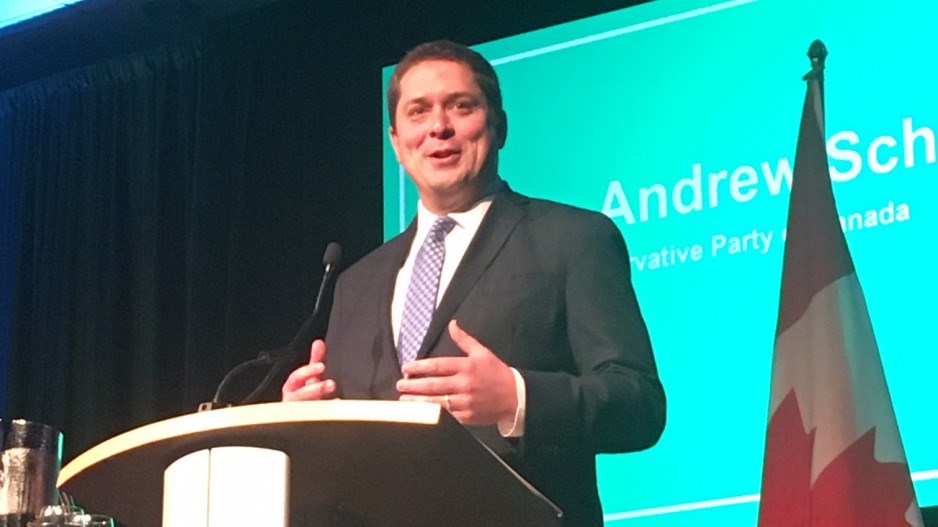A Conservative government would implement policies that would make resources industries in Canada very happy, and drive environmentalists apoplectic.
Conservative Party Leader Andrew Scheer vowed Thursday, January 31 that a Conservative government would immediately scrap a national carbon tax. It would also repeal Bill C-69 (which replaces the Environmental Assessment Act), open Canada’s north to resource extraction and use carrots, not sticks, in the Conservatives' yet-to-be-revealed climate change strategy.
Sheer also told Business in Vancouver that the Conservatives are also looking at the question of foreign funding of environmental group in Canada, and hinted they might be excluded from participating in environmental reviews.
Scheer was the keynote speaker this morning at the final day of the Association of Mineral Exploration (AME) Roundup conference in Vancouver. He drew applause when criticizing the Justin Trudeau government’s policies on resource industries like mining and oil and gas.
“These last three years have been a mess of regulatory uncertainty,” he said. “Relationships with key trading partners have been put at risk with Trudeau’s failed foreign policy.”
He characterized bills like C-69, which revamp regulatory review processes as, “as an alphabet soup of ideological regulatory burden.”
“We call Bill C-69 the pipeline killing bill because we know what it will do on oil and gas, but the effects on your industry are also very concerning,” he said.
Sheer said the Trudeau government’s approach to Canada’s north is to treat it “like one big giant park,” and said a Conservative government would open it up to resource development. That would be particularly attractive to Vancouver's mining and mineral exploration sector.
And he placed environmental activism in his cross-hairs, blaming them for some of the resource projects, like pipelines, that have been stalled or killed.
“We know that activist groups from around the world, but specifically those countries that are our competitors, are using funds from foreign entities to attack Canadian industry,” Sheer said.
“More and more I hear from First Nations leaders who are frustrated because they know some of the groups that are protesting (projects) are receiving foreign funds," Sheer said. "We should be deciding these types of things as Canadians, not under the influence of other governments or other private companies or other organizations around the world.”
He said there needs to be more transparency around where non-profits get their funding and how it is spent.
“If you’ve got a group in Canada that purports to be representing Canadians and raising money from Canadians, but in reality they are receiving large amounts of cash or funding from other groups and other countries, we have to have a reporting mechanism on that.”
He added that he thinks some of these groups should even be denied intervener status during environmental review and National Energy Board (NEB) hearings.
“One of the things I’ve said is that, when we do have these types of hearings, like an NEB hearing, that groups that accept foreign funding would not be allowed to participate. I don’t believe that foreign actors should play a role in advocacy here in Canada and then be given the same weight as people affected by a decision or affected by a project.”
Asked what his environmental policies are, Sheer said they will be detailed in the Conservative platform in the lead-up to the October federal election, but said one thing a Conservative government would do is to work with provinces and municipalities to stop the dumping of untreated sewage into oceans.
Asked about his non-existent climate change action plan, Scheer told Business in Vancouver that the Trudeau government’s strategy isn't really a climate action strategy either, but simply a tax plan.
That’s not exactly true. The Liberal government has committed to phasing out coal power, new low-carbon fuel standards, and investments in renewable and clean energy technology.
Generally, Scheer said he would rather see incentives to businesses and ordinary citizens to take actions that reduce carbon emissions, and invest in innovation.




